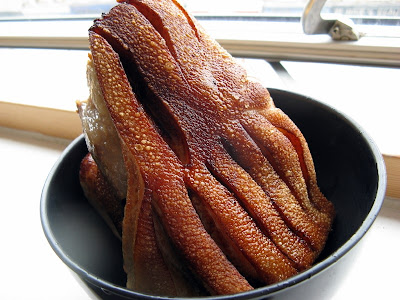It looks like a great hunk of gloop, doesn't it?
A packet of dried lily buds has been sat in my cupboard for months, waiting for me to do something with it. After an appeal for help, a friend sent me a scan of a recipe book he picked up in Malaysia that consists only of pork belly recipes, and using 50gr of the strands meant I could get rid of at least half a packet.
I've used this method of cooking pork belly before. It's lengthy and involves multiple stages of cooking, but the end dish results in tender meat, silky fat and subtle flavours. It's not for the faint of heart; deep frying a piece of pork belly usually results in a fair amount of hot oil being spat all over the kitchen. Squeals can be heard emanating from my terrified but salivating mouth.After an initial boiling to rid the meat of impurities and scum, it is then dried and slid into a wok of bubbling oil until it takes on a gorgeous caramel colour.
Next, it is packed snugly into a bowl with various aromatics, to be set into a steamer to gently stew away until it becomes a dish that can be pulled apart by a deft hand with chopsticks - or in my case, tugged apart messily with a knife and fork.
The deep frying intensifies the porky flavour of the skin, while steaming makes sure that the skin goes from slightly tough and crisp to gelatinous and yielding in the mouth. Most European recipes prize the crisp crackling on pork belly, but Chinese recipes are not so rigid. Pig skin sliding down around the plate and eventually down the throat is just as satisfying as a fragile shatter beneath the teeth. The lily buds lend a floral Chinese herbal note - the kind you get when you catch a whiff of Chinese herbal medicine shops - to the dish, with a subtle meaty aniseed flavour from the star anise. I couldn't resist messing around with the recipe a bit; I added dried mushrooms, soy sauce and preserved vegetable for some added savoury tones.
Scooped up with some rice and served with stir fried pak choy, this dish was moreish but stayed light, without the richness of the belly weighing too heavily. It's not much of a looker though.
Steamed Pork Belly With Lily Buds
Serves 4
1kg pork belly, skin on and scored
4 star anise
4 spring onions
1 tbsp Tianjin preserved vegetable
6 dried shiitake mushrooms
50gr dried lily buds
70ml Shaoxing rice wine
2 tbsp light soy sauce
1 tbsp dark soy sauce
70ml chicken stock
1 tsp sesame oil
1 tbsp cornflour
300ml vegetable oil
Bring a large pan of water to the boil. Reserve a bowlful and soak the lily buds and shiitake mushrooms in this. Place the pork belly carefully into the saucepan and simmer on a medium heat for half an hour. Meanwhile, rinse the preserved vegetable and chop the spring onions roughly.
Drain the pork belly and pat dry. Rub with the dark soy sauce. VERY carefully, deep fry the pork belly skin side down only until golden in colour. You might want to wear long sleeves for this. Remove and soak in cold water for 30 mins.
Place the pork belly skin side down in a large bowl. Drain the mushrooms, lily buds and preserved vegetable - pick the mushrooms out and place on top of the belly. Add the spring onions and nestle the star anise within.Top with the preserved vegetable and pour over the rice wine, sesame oil, soy sauce and chicken stock. Place in the steamer and steam for 45 minutes. Remove the lid and arrange the rehydrated lily buds on top and steam for a further 1 hour and 10 minutes.
When this has finished, carefully remove the bowl from the steamer. Scrape the lily buds and mushrooms from the top and arrange on a dish. Carefully lift the meat out of the bowl and place on top of the lily buds, skin side up. Decant the liquid into a saucepan and bring to a simmer. Loosen the cornflour with 1 tbsp cold water amd stir into the saucepan. Simmer until thickened and glossy and pour over the pork belly to serve.
NB. Along with the Tianjin preserved vegetable which looks like this, you can get the dried lily buds in Chinese supermarkets.





Tidak ada komentar:
Posting Komentar